Photo by Chris Ried on Unsplash
Python is often seen as a beginners language and many people turn to Python to get their feet wet and test the water when it comes to learning to code.
The reason for this is that Python was designed for readability. The syntax is simple, often the code reads like a sentence and it teaches you how to structure your code properly with tabbing because failing to do so results in code errors.
Not only is Python easy to learn, it is popular and versatile enough to do some incredible things with it once you have learnt the basics.
You can use Python to develop websites and desktop applications, build neural networks and machine learning algorithms, scrape websites, build games and much more
From a personal perspective, knowing what I know now about programming, I would start learning Python first before a language like Java. Java is a great programming language and certainly has its uses, but Python is a lot less verbose and has some incredible number crunching capabilities when used with libraries such as NumPy.
Another thing I like about Python is that you can build proof of concepts and prototype things very quickly with relatively few lines of code. This is especially useful if you want to quickly assess a different machine learning algorithm, prototype a new neural network architecture or if you want to build a proof of concept to exploit a web vulnerability.
With all this in mind, the best way to learn Python in my opinion is to pick an online course and see it through to the end. Then once you’re happy with the language, practice and practice and then practice some more.
The best way I’ve found to do this is to set yourself an interesting project. This could be to build yourself a website, a web scraper, a game or something that integrates with a third-party API. By putting the theory into practice, you will really start to build up your confidence and learn how to code.
So, if you fancy getting up to speed with Python, then you’re in the right place, here are 20 of best online Python courses:
TL:DR:
There’s a lot of courses to choose from here. So to help your decision, my personal recommendation is the Complete Python Bootcamp (#CommissionsEarned) and Google’s Python class. The Complete Python Boot camp is a paid course, but is hugely comprehensive and the most popular Python course on Udemy with over 262,000 students enrolled!
Google’s Python class is a free course and although not quite as comprehensive, it’s a great course and has proven its worth, as it is used by Google internally to help their employees get up to speed with the language.
1. Complete Python Bootcamp – Udemy

First up is the Complete Python Bootcamp (#CommissionsEarned) which is by far the most popular Python course on Udemy and is a one-stop-shop for learning Python programming from the ground up, all the way through to a professional level.
The course starts with the absolute basics, so you’ll learn all about Python data types and data structures, loops, if-statements, standard mathematical operators, how to use Object Oriented Programming and you’ll also learn how to use Jupyter notebooks.
Once you’ve gone beyond the basics, the course will then teach you how to create GUIs, create games like Tic Tac Toe and Blackjack and it will also teach you some of the more advanced Python features like the collections module and how to work with timestamps.
This is a very comprehensive course with over 100 lectures and more than 20 hours of video but it will also teach you Python from a practical perspective. This is very important because from a personal experience, I have found that things start to make more sense once you start to put things into practice.
The course is aimed at complete beginners, so you don’t have to have programmed before but it is also applicable to programmers that wish to switch languages or improve their skills.
2. The Python Mega Course: Build 10 Real World Applications – Udemy

I’ve included The Python Mega Course (#CommissionsEarned) because of its emphasis on building practical applications with Python.
The course takes you from creating your first Python program through to Python basics such as variables, Strings, mathematical operators, loops etc.
Once the basics are in place, the course then moves onto runtime errors, file handling and then onto building your first real world application where you will load json data, fix bugs and more.
Next you’ll learn about Pandas and NumPy which are two very popular libraries for handling datasets and number crunching and are both used extensively in Artificial Intelligence applications.
Next, you’ll build more real world applications many of which are focused on web programming. So you’ll learn how to build a website, how to scrape website data and how to build web apps that also interact with a backend database.
This course is called a “mega course” for a reason. And that is because it covers a lot. You’ll build no less than 10 applications and touch on a huge variety of topics from web programming, through to desktop applications, image processing and database applications.
The course is perfect for all student levels because it starts from ground zero and progresses to a fairly advanced level.
3. Automate the Boring Stuff with Python Programming – Udemy

This course is a bit different to the others because it not necessarily aimed at those wishing to program in Python for a career. It is really aimed at general office workers, academics and administrators who want to improve their productivity.
Automate the Boring Stuff (#CommissionsEarned) is a very practical course focusing on how to automate those boring, repetitive tasks by writing simple Python programs.
The course will teach you the basics of Python like if-statements, loops, functions, lists etc but then the course moves onto more interesting things like web scraping, how to read and edit excel spreadsheets, sending emails and even how to automate the keyboard and mouse!
Automate the Boring Stuff will not turn you into a Python programming professional as it doesn’t focus on object oriented programming or computer science but instead focuses on the absolute essentials you need to know in order to write small programs that automate the most mundane tasks in the least amount of time.
The course is not only useful to office workers, but also to those who want to get their feet wet with programming and learn to code useful applications. It is also applicable to QAs, devops, and admins who want to learn scripting in Python or those that wish to add a useful skill to their resume.
4. Complete Python Masterclass – Udemy

The Complete Python Masterclass (#CommissionsEarned) focuses on teaching you how to program in Python 3 step-by-step.
This course is for a beginner or an intermediate and no previous programming experience is required.
The first part of the course gets you setup and whether you’re on Windows, Mac or Linux, you’re covered.
Once you’re setup, you’ll learn the basics of Python such as variables, Strings, program flow control and lists. There’s even a section on the binary number system which isn’t often covered in these courses, but it’s a useful addition nonetheless.
The course then explores Python dictionaries and sets, Input and Output (I/O) and of course object-oriented programming.
There’s quite a large section on how you can interact with databases using SQLite which is an extremely useful topic to learn, however there isn’t any web-based stuff which is slightly disappointing.
That said, if you want to learn pure Python, then this is a good course. The course often explains the ‘why’ as well as the ‘how’ and the course is regularly updated and great support is provided by the author who will answer any questions you may have.
Personally I wouldn’t worry about the lack of web-based stuff, because once you have the basics in place, topics like this can be easily absorbed.
5. The Python Bible – Everything You Need to Program in Python – Udemy

Next up is The Python Bible (#CommissionsEarned) and as the course title suggests, it does teach you everything you need to know to get started with Python programming.
You’ll learn Object-Oriented Programming (OOP), how to create programs using logic and data structures and also how to use variables, Strings and loops in your programs to maximize efficiency.
What I like about this course is the simple way that they explain things. Variables for example are “simple little boxes” and object-oriented programming is explained in the context of ‘coins’ and in the final project, you’ll make your own bank!
There are 11 easy-to-follow projects in this course that you will build to put the theory into practice and over 72 lectures in total.
The main USP with this project is that it is the “world’s most fun project-based Python course”. This is important as it will keep you interested and engaged and you’ll learn more as a result.
6. The Complete Python 3 Course: Go from Beginner to Advanced! – Udemy

This is a good pick if you want to go from complete beginner to an advanced level in Python programming.
You’ll learn not just the theory but you’ll also put what you have learned into practice with several coding exercises.
Similar to previous courses, with The Complete Python 3 Course (#CommissionsEarned) you’ll learn the basics first. So you’ll learn about data types, comments, expressions, Strings, branching, loops and more. A decent chunk of this course is devoted to object-oriented programming which is a plus and there’s even chapters on data visualization and the NumpPy library which is incredibly useful to learn about.
The latter part of the course deals with debugging and regular expressions, which are two hugely important topics to learn regardless of language.
The target audience is for people who are new to Python, new to programming or both. There’s no prerequisites other than basic computer skills, access to a computer with an Internet connection but above all, to get the best out of this course, you must be willing to learn, take notes and put the lessons into practice.
7. 30 Days of Python – Udemy

This course is for complete beginners, but there’s stuff in here for the pros too!
30 Days of Python (#CommissionsEarned) will help you understand the basics of Python but then moves on at Day 10 to something ‘real’ and useful. So you’ll learn how to send HTML and plain text emails in Python and how to read, write and edit CSV files.
Days 21 to 25 cover web scraping using the BeautifulSoup library and days 26-29 deals with APIs.
APIs haven’t been covered extensively in the previous courses, so if you’d like to learn how to retrieve data from an API (like the Twitter API for example) then this course has you covered.
Most web-based applications call out to API’s on a regular basis, so this is definitely worth knowing about especially if you plan to develop software using Python professionally.
The target audience for this course is anyone that is interested in learning Python such as beginners, growth hackers, entrepreneurs or anyone interested in learning how to Scrape Websites for data/big data analysis.
8. Programming Foundations With Python – Udacity
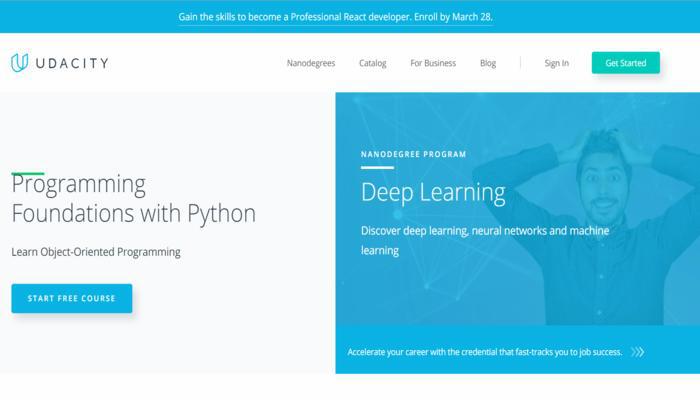
Programming Foundations from Udacity is perfect for programming beginners. It introduces the basics of Python programming including object-oriented programming but teaches the language by getting you to do mini projects as you progress through the course.
The course takes things slowly, one step at at time, and doesn’t make huge leaps leaving the student to fill in the gaps.
Despite being a beginners course, there are some prerequisites. So you are expected to know some basic programming concepts such as if-statements, loops and functions but it doesn’t matter which programming languages you have looked at previously to learn these ideas.
There are a couple of things that make this course great. The first is that you get to build projects which will help cement your understanding of the language.
The second, is that the course is totally free.
It’s not as comprehensive as the Udemy courses, but if you know a little about programming, this course could get you up and running with Python very quickly.
Check out the YouTube video below to get a sneak preview of the course content, in particular the projects that you will build.
9. Google’s Python Class – Google
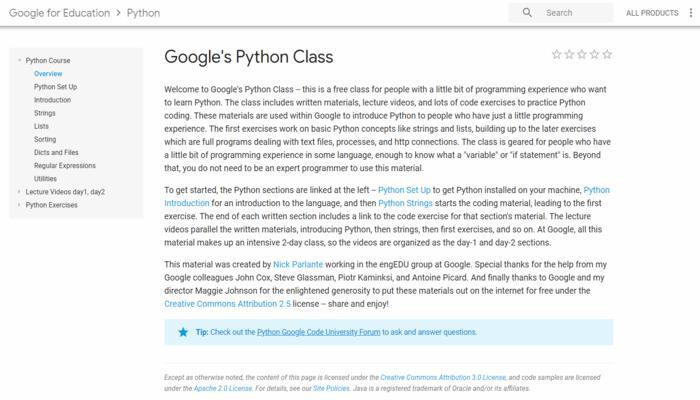
Let’s face, anything with the name ‘Google’ in it, is going to be good in my opinion. And this course is no exception.
Like the previous course by Udacity, Google’s Python class is a free class for people with a little programming experience who want to get to grips with Python.
The material provided in this course is the same material that Google use internally to get people up to speed with Python.
The course includes written materials, lecture videos and there’s an emphasis on coding exercises to help you practice programming in Python.
The first few exercises concentrate on basic concepts such as strings and lists and eventually build to the point where you’ll be building full programs that are able to read text files, deal with processes and manage http connections.
You need to know something about programming to be able to do this course. So you’ll need to be comfortable with variables and if-statements but you definitely don’t need to be an expert.
10. Learn Python: Python for Beginners – Udemy

Learn Python (#CommissionsEarned) is a complete introduction to Python for beginners and will enable you to learn the language from scratch.
You’ll start with the basics of Python, learning about Strings, variables, data types etc. Then you’ll move onto loops and conditional statements before getting to grips with functions and reading files.
Then once you’ve learnt the basics, you’ll put everything you have learned into practice by building a fun game which I think is quite a nice way to reinforce the knowledge that you have picked up.
In addition to the game, there’s a bunch of exercises that will challenge you along the way which will really help build your practical skills.
Again, the target audience is anyone really that has an interest in learning to program in Python and this includes programmers, students and teachers.
This is a great course but it doesn’t cover everything. So you won’t find any web programming or database tutorials in this course, but it does teach the absolute essentials which is the most important bit.
I’ve always said that if you understand the language and the basics of programming, then topics such as APIs, databases, web services etc can be easily picked up further down the line as and when you need them.
11. Complete Python Web Course – Udemy

As a developer who does a lot of web based programming, I felt the need to include the Complete Python Web Course (#CommissionsEarned) by Udemy.
With the Python Web course, you’ll learn the basics of building Python web applications all the way through to an advanced level.
In terms of the course content, you’ll start off with the basics of Python programming and then slowly move onto web based Python development.
In terms of the web based content, you’ll learn about JSON and XML, how to make your first HTTP GET request, how to scrape websites and then you’ll move onto building your first web application using Flask.
The great thing about building this web application is that you’ll learn a lot about how the Internet works and how websites are put together. So you’ll learn about REST APIs, CSS styling, how to build user registration pages and more.
There’s even stuff around saving data to a MongoDB databases, regular expressions, sending emails and even how to deploy your applications to a production server in Digital Ocean.
There’s a lot of useful and relevant stuff here, so if you want to get into any kind of web based software development, then this course is highly recommended.
12. Learn Python: The Complete Python Programming Course – Udemy

If you have never touched programming before, but wish to get into coding, then Learn Python (#CommissionsEarned) will help you get there step-by-step.
The course brands itself as a “one-stop-shop” for everything you need to know in order to get started with Python.
This course is pretty comprehensive, so all the basics are here such as classes, object-oriented programming, file input/output, python modules to name but a few. You’ll also learn how to crawl the web to get stock market information and the weather and you’ll learn about HTML parsing and web scraping along the way too.
The course doesn’t cover much database or web based content but there’s some really useful topics which are covered such as MatPlotLib and data analysis using Pandas which are highly relevant for machine learning and AI.
You’ll also develop two games, bounce and pong which definitely makes things interesting!
13. Data Science, Deep Learning, & Machine Learning with Python – Udemy

I’ve included Data Science, Deep Learning, & Machine Learning with Python (#CommissionsEarned) because not only does it teach you the basics of Python, it also gives you hands-on experience with developing machine learning algorithms, artificial intelligence – topics which are becoming more and more popular with many different companies and employers.
There are two parts devoted to Python basics, so essentially it’s a crash course on Python covering how to import modules, Python data structures, functions, boolean expressions, looping and so on.
The course then moves onto the more interesting stuff such as the Pandas library, how to build predictive models to predict car prices, recommender systems, how to deal with real-world data (which is a skill in itself), Support Vector Machines, machine learning on Big Data with Apache Spark and finally there’s over two hours of content devoted to Deep Learning.
The Deep Learning section is the most interesting in my opinion as you’ll learn about Tensorflow (Google’s Deep Learning API), convolutional neural networks for image recognition and recurrent neural networks.
There’s even a final project where you’ll apply what you have learned to build a machine learning model to classify a real data set of mammograms as either benign or malignant!
14. Learn Python, it’s CAKE – Udemy

Learn Python, it’s CAKE (#CommissionsEarned) is aimed at absolute beginners and is taught in away that makes it very easy for the beginner to understand. The course is taught as if it’s your friend talking to you rather than sat in a lecture listening a professor reading a pre-prepared script!
The course consists of 42 lectures and over 7 hours of video in total. The course concentrates on the the basics of Python for most of the course covering if-statements, functions, loops, regular expressions, data types and so on.
Following on from the basics you start to do some more interesting things like building a calculator program, a word game, a fun program around chicken nuggets and more!
The course then concludes with a bonus module dedicated to regular expressions with the last module providing advice on how to take your knowledge further.
15. Intro to Computer Science – Udacity
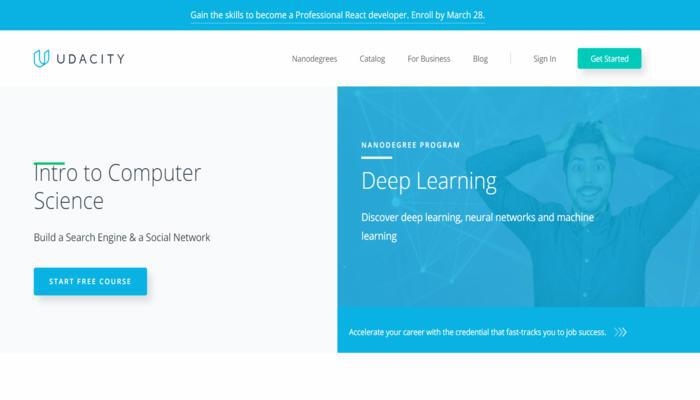
Although Intro to Computer Science doesn’t have the word ‘Python’ in its title, you will learn Python from scratch and you’ll also explore computer science basics which I think is important to help you understand the bigger picture in terms of how computers work and how the Internet works.
I think this course is a great start into the world of programming and computers in general. The instructor explains the concepts step-by-step and at the end of each video you can build up your practical skills by solving practical problems using Python.
A great feature of this course is that you get to build a search engine and even a social network!
The course is quite comprehensive and takes about three months to complete, but it is aimed at complete beginners and is completely free.
16. The Python Track – Treehouse
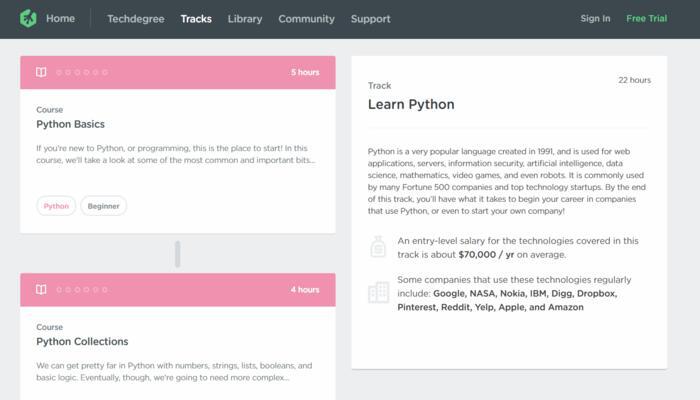
The author of this course, Kenneth Love, has actually created a few popular Python libraries and knows his way around the full web stack, so you’re getting taught by an expert here.
The Python Track (#CommissionsEarned) is aimed at complete beginners and so you’ll start with the basics and learn the most common and important parts of the language. Then you’ll move onto Python collections, object-oriented programming before moving onto more advanced topics such as how to write clean code, how to handle dates and times and regular expressions.
You’ll also learn about using databases and how to test your code properly using using Python’s unit test library.
Unit testing is a hugely important part of good software development and not something that has been covered extensively in these courses, so I’m glad to see a module dedicated to it here.
17. Learn Python – Codeacademy
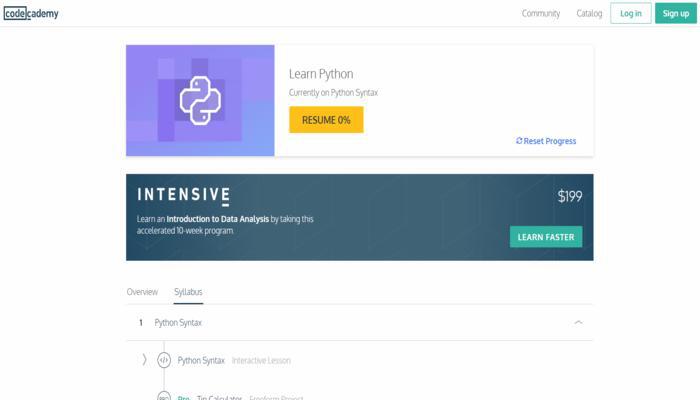
Codeacademy has some great online resources, and Learn Python (#CommissionsEarned) is no exception.
This course is not only a great introduction to Python but a good introduction to programming in general.
The content is mostly free but interspersed with ‘pro’ content which you can get with a Codecademy Pro account. If you’re a complete beginner though, the free stuff should suffice.
In terms of the syllabus, you’ll start with basic Python syntax, you’ll learn about Strings, the console, conditional statements, how to control the program flow, functions, lists/dictionaries, loops and more.
There’s also content around object-oriented programming and classes and how to handle file input and output.
Considering that this course is free, you do get quite a lot, albeit only the basics and to access the final project, you have to upgrade.
But by the end of this course, you will be familiar with the Python syntax and you’ll have the skills and knowledge to write Python programs and put what you have learnt into practice.
18. Snakify – Snakify.org
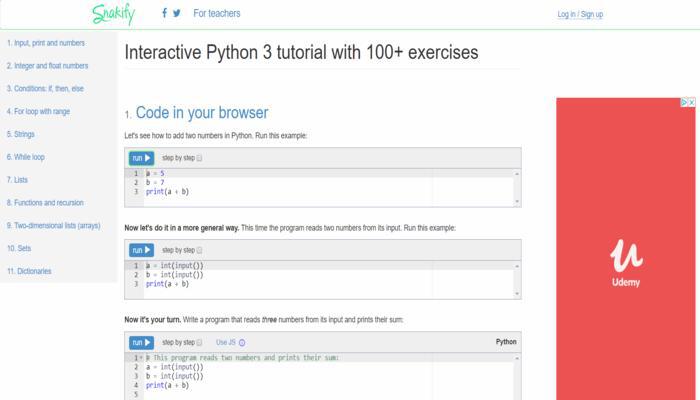
Snakify is in a different format than the other courses in this roundup. It’s actually an “interactive manual of the Python 3 programming language”.
So what does that mean exactly?
Well, everything is done in the browser basically. There’s a number of lessons that you go through and each lesson has several problems for you to tackle ranging from easy to hard.
Before you tackle the problems however, there’s a bunch of theory that you are encouraged to read at the start of each concept within the lesson and then there’s a number of code examples which you can run and see the output for yourself.
You can even practice by modifying the code samples and step through the code line by line to see what output your code has produced. All this is achieved using the in-browser code visualizer without the need for the Python interpreter on the command-line.
The great thing about this course is that you don’t need to setup anything to get started, you can simply work through the lessons, write code and debug your code on any device with a web browser.
There are 11 lessons in total, over 100 coding problems and you are taken right the way through the basics of Python programming without any technical knowledge required, so again, this is a course for complete beginners.
19. Python Fundamentals – Pluralsight
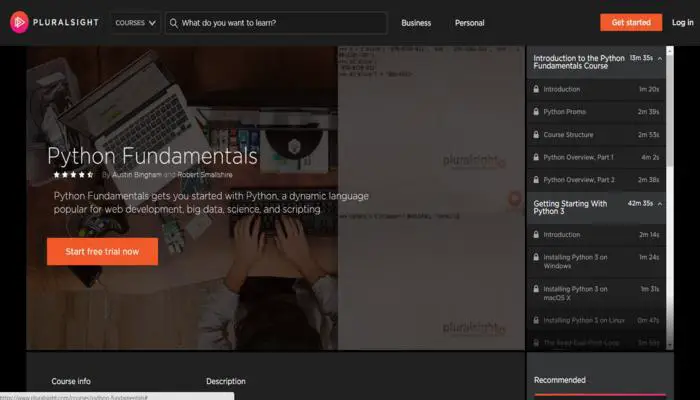
This isn’t a free course, but Python Fundamentals on the Pluralsight platform is regarded as a great course and one of the most thorough you’ll find online.
The course starts with a two-part overview of Python and then moves onto the installation, covering Windows, Mac OS X and Linux.
Next, the course covers basic datatypes, operators, conditional statements and while loops.
Beyond these basics, there’s whole chapters dedicated to Strings, Python modules, Objects, Collections, Exceptions, Iterables, Classes and files and resource management.
The last chapter deals with distributing your Python programs to a production environment, debugging, third-party modules and more.
The course doesn’t get you building whole applications or games and neither does it cover web-based Python programming or databases, but it does cover the basics very well indeed.
20. Introduction to Computer Science and Programming Using Python – MIT
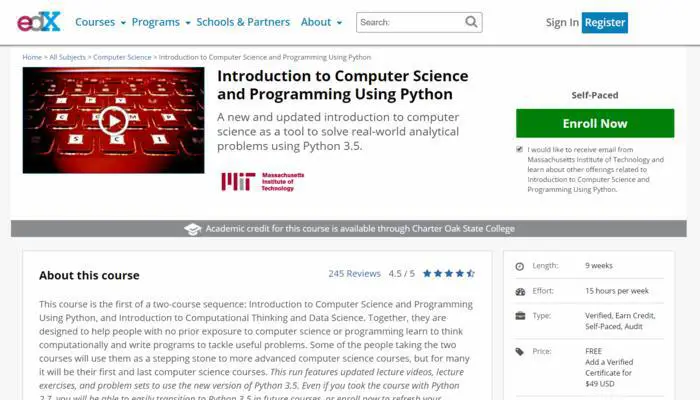
Last, but certainly not least is the Introduction to Computer Science and Programming Using Python by non other than the Massachusetts Institute of Technology (MIT).
Again, this is not just a Python course, but a Computer Science and Python course rolled into one.
It’s a long-ish course, at 9 weeks in total and you’re expected to put in about 15 hours per week in terms of effort.
Now this isn’t a total beginners course, as you do have to have a reasonable aptitude for mathematics. Either that, or you will find that there is a steep learning curve and so you may have to put more time and effort into understanding the course content.
The course focuses on breadth rather than depth and provides introductions to a wide variety of topics within computer scicence.
The course is also designed to teach you how to think computationally and use programming to help tackle useful problems. So this course will give you the tools and knowledge you need to assess how you might use computation to accomplish certain goals within your career.
In addition to the basics of the Python programming language, you’ll learn about the notion of computation, simple algorithms, testing and debugging, data structures and there is also an informal introduction to algorithmic complexity.
This is a rigorous and challenging course, but potentially very rewarding.
Wrapping up
So there you go, that’s my roundup of the best online Python courses. I have handpicked all of these courses and done a lot of research to find the best courses on the Internet at the moment, so I’m sure you won’t be disappointed.
Although there are twenty courses here, they won’t all suit everybody because we all have our own ways of learning. Some of us prefer to listen to a formal lecture, others prefer to learn by reading and some of us prefer getting stuck in and having a go. So my advice would be to pick a course and see how you get on. If you bookmark this page, then you can always come back to it at a later date to try another course.
If you are still unsure which course to use and just want a recommendation, then I recommend the Complete Python Bootcamp (#CommissionsEarned) and Google’s Python class. All these courses are great though and you won’t go far wrong with any of them.
As with anything though, the best way to learn something is to practice. You can read as much theory as you want but there’s no substitute for actual practical experience and just “having a go”.
Sure, learning a new language programming language isn’t going to be easy and there will be some things that you will struggle with, but that’s normal, just don’t give up. Come back to it the next day after a good night’s sleep 🙂
If you persevere, then you will learn an invaluable skill. Python developers are in-demand and there is no better time to learn it than at this present time.
One final note is that Artificial Intelligence is rapidly on the rise and many of the APIs like Tensorflow use Python – another good reason to learn it!
